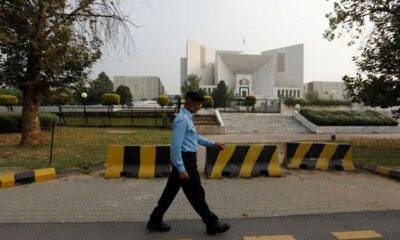Latest News
The debate over counting dissenting votes
Published
4 years agoon
By

If there’s one place where reality exists not as a line, but as a circle, it’s here. As the ruling party recoils towards its old haunt at D-Chowk, there are once again talks of both military extensions and possible calls from military extensions. And the question of whether or not a prime minister remains in office may, once again, be decided by the judiciary.
Whatever plans the government may have to interfere with the vote of no-confidence, they are likely to be challenged before the court. But now, as it turns out, the government has pre-emptively sought the Supreme Court’s opinion on the relationship between a vote of no-confidence and disqualification for defection. As two sides now wait on the Supreme Court, at the heart of it all will likely be the battle against redundancy.
The legislature passes laws and then leaves them for judges to interpret. So, as a safeguard against overly inspired interpretations, courts self-regulate through certain ‘rules of interpretation’. One of these is that if your chosen interpretation results in absurdity then you have to interpret it differently.
The two provisions of the constitution that provide the battleground are Articles 63A and 95. Article 63A provides for “disqualification on grounds of defection”, which includes a member’s voting contrary to the directions of their party in a vote of no-confidence against the prime minister (we’ll call this a ‘dissenting vote’, for now). And that vote of no-confidence is provided for in Article 95, under which a prime minister ceases to hold office if a majority of the National Assembly votes as such.
Those who oppose counting dissenting votes argue that allowing such votes would leave Article 63A hollow: if potentially purchased votes are counted, then what good is 63A? On the other side of the trench, what use is a vote of no-confidence if a significant portion of the National Assembly can’t even fill in their comments cards?
But this is anything but a paradox. One results in absurdity and the other in an outcome that is, at best, undesirable. Consider a government that comes to power under a super-majority: unless the party decides to go kamikaze, a vote of no-confidence would basically never be an option. That is to say that for the PML-N’s term beginning in 1997, when it swept about two-thirds of the seats in the National Assembly, Article 95 would have basically been dormant — an obvious absurdity.
Or consider if it had won further forty or so seats. Now, with over 80% of the seats in the National Assembly, the PML-N would have found itself insulated from even having someone table the resolution for a vote of no-confidence, let alone having people vote on it. Again, an absurdity.
But on the other hand, allowing dissenting votes protect the constitution. Preventing horse-trading and floor crossing is, indeed, important. But to argue that Article 63A can only do its job if dissenting votes are discarded is disingenuous. Prevention comes from consequences.
Few would argue that being disqualified from the National Assembly is not such a consequence. You may argue that it doesn’t go far enough, but there’s no absurdity here. And the way to take it further is to have the legislature change the law, not to coax unelected judges into reading in terms that don’t exist.
While on reading in items that don’t exist, one provision that once did exist was Article 96(5).
Back when the vote of no-confidence was first introduced to the constitution of 1973, it was Article 96. And towards the end of Article 96 was a little clause declaring that if a voter from a political party cast a vote “in support of a resolution for a vote of no-confidence” while “the majority of the members of that political party in the National Assembly has cast its votes against the passing of such resolution”, then those votes in support would be “disregarded”. That clause was later removed from the constitution in 1985.
Clearly, parliament was not unaware of the option to disregard votes, but the legislature chose to delete it. Another principle of interpretation that courts use is that things that are ‘conspicuously absent’ from a law are not to be grafted into it by judges. The fact that this consequence no longer exists is, thus, a rather conspicuous absence.
Through the years, the legislature has wrestled with how to handle defection. It has expanded and contracted what ‘defection’ means for the purposes of disqualification, and it has tinkered with the consequences.
At times, the Political Parties Act disqualified members of parliament only when they withdrew from a party, while votes contrary to the majority of the party’s membership were discarded. At others, votes were neither discarded nor were there personal consequences. And in present times, the equilibrium is clear: you can be disqualified for casting a dissenting vote, but there is no provision for discarding such a vote.
This is all to say nothing of the obvious chain of causation: the vote must be cast before you are disqualified. If you haven’t cast the vote, there is nothing to disqualify you for. You can be disqualified for voting, “in relation to” a vote of no-confidence, but the disqualification is for the act of voting, not for acts “in relation” to the vote. This means, of course, that you cannot be disqualified for standing in line to vote, or even announcing that you will vote against the prime minister. The text is clear, and only the legislature can alter it.
And because even disqualification by the party head is the first subject to confirmation by the Election Commission, and then the Supreme Court, all of this disqualification business is close to impossible during a vote of no-confidence.
So neither a prime minister, nor a party head, nor the secretary of the National Assembly, nor a speaker can do anything to prevent the casting of the vote. The vote will be cast, and in due course, the member who cast it ought to be disqualified. That’s all there is to it.
And yet, suggestions abound to the effect that the speaker will, somehow, disrupt the casting of such votes. Ordinarily, this would be a rather uncharitable presumption.
This is particularly so given the presumption of the neutrality of the speaker (which, in some countries, is why speakers wear robes). But when the speaker tweets his loyalty to the prime minister, against whom the vote is to be passed, it doesn’t hurt to double-check.
The roles of the speaker and the secretary of the National Assembly are both laid out in the National Assembly’s own rules. Nowhere is the speaker allowed to discard a vote.
In fact, the speaker only receives the final count and not even the list of voters; it is the secretary who collects the lists and passes on the final count to the speaker. And the secretary, who does not even figure into the whole procedure for disqualification under 63A, obviously can’t disregard votes on this basis, either.
So, the options that the speaker is left with are the rather blatant suspension or withdrawal of members, which are only allowed for “disregarding the authority of the speaker” or “grossly disorderly” conduct. Such violations must, of course, also be connected to some violation of procedure or law.
Indeed, against all of these insinuations, there seems to be no law to come by. If the constitution is to be followed, then parliament shall decide whether the prime minister shall stay or not — as is its right — for better or worse.
But then again, rain may yet not fall on the charade. Reality is, after all, a circle. And we’ve seen it all happen before.
The writer is a lawyer. Email: salaar.khan@columbia.edu. Tweets at @brainmasalaar
Originally published in The News
You may like
-


Supreme Court annuls trials of civilians in military courts
-


Sea conditions ‘very high’ as Cyclone Tej moves towards northwestward
-


IMF condition: ECC set to green light gas tariff hike today
-


UN experts claim Israeli actions in Gaza ‘violation of international humanitarian law’
-


Arshad Sharif’s wife files lawsuit against Kenyan police over journalist’s killing
-


World Cup 2023: Pakistan opt to bowl first against Australia after winning toss

In a unanimous verdict, a five-member bench of the Supreme Court on Monday declared civilians’ trials in military courts null and void as it admitted the petitions challenging the trial of civilians involved in the May 9 riots triggered by the arrest of Pakistan Tehreek-e-Insaf (PTI) chief Imran Khan in a corruption case.
The five-member apex court bench — headed by Justice Ijaz Ul Ahsan, and comprising Justice Munib Akhtar, Justice Yahya Afridi, Justice Sayyed Mazahar Ali Akbar Naqvi and Justice Ayesha Malik — heard the petitions filed by the PTI chief and others on Monday.
The larger bench in its short verdict ordered that 102 accused arrested under the Army Act be tried in the criminal court and ruled that the trial of any civilian if held in military court has been declared null and void.
The apex court had reserved the verdict earlier today after Attorney General of Pakistan (AGP) Mansoor Usman Awan completed his arguments centred around the domain and scope of the military courts to try the civilians under the Army Act.
At the outset of the hearing today, petitioner lawyer Salman Akram Raja told the bench that trials of civilians already commenced before the top court’s verdict in the matter.
Responding to this, Justice Ahsan said the method of conducting proceedings of the case would be settled after Attorney General of Pakistan (AGP) Mansoor Usman Awan completed his arguments.
Presenting his arguments, the AGP said he would explain to the court why a constitutional amendment was necessary to form military courts in 2015 to try the terrorists.
Responding to Justice Ahsan’s query, AGP Awan said the accused who were tried in military courts were local as well as foreign nationals.
He said the accused would be tried under Section 2 (1) (D) of the Official Secrets Act and a trial under the Army Act would fulfill all the requirements of a criminal case.
“The trial of the May 9 accused will be held in line with the procedure of a criminal court,” the AGP said.
The AGP said the 21st Amendment was passed because the terrorists did not fall in the ambit of the Army Act.
“Amendment was necessary for the trial of terrorists [then] why amendment not required for the civilians? At the time of the 21st constitutional amendment, did the accused attack the army or installations?” inquired Justice Ahsan.
AGP Awan replied that the 21st Amendment included a provision to try accused involved in attacking restricted areas.
“How do civilians come under the ambit of the Army Act?” Justice Ahsan asked the AGP.
Justice Malik asked AGP Awan to explain what does Article 8 of the Constitution say. “According to Article 8, legislation against fundamental rights cannot be sustained,” the AGP responded.
Justice Malik observed that the Army Act was enacted to establish discipline in the forces. “How can the law of discipline in the armed forces be applied to civilians?” she inquired.
The AGP responded by saying that discipline of the forces is an internal matter while obstructing armed forces from discharging duties is a separate issue.
He said any person facing the charges under the Army Act can be tried in military courts.
“The laws you [AGP] are referring to are related to army discipline,” Justice Ahsan said.
Justice Malik inquired whether the provision of fundamental rights be left to the will of Parliament.
“The Constitution ensures the provision of fundamental rights at all costs,” she added.
If the court opened this door then even a traffic signal violator will be deprived of his fundamental rights, Justice Malik said.
The AGP told the bench that court-martial is not an established court under Article 175 of the Constitution.
At which, Justice Ahsan said court martials are not under Article 175 but are courts established under the Constitution and Law.
After hearing the arguments, the bench reserved the verdict on the petitions.
A day earlier, the federal government informed the apex court that the military trials of civilians had already commenced.
After concluding the hearing, Justice Ahsan hinted at issuing a short order on the petitions.
The government told the court about the development related to trials in the military court in a miscellaneous application following orders of the top court on August 3, highlighting that at least 102 people were taken into custody due to their involvement in the attacks on military installations and establishments.
Suspects express confidence in mly courts
The same day, expressing their “faith and confidence” in military authorities, nine of the May 9 suspects — who are currently in army’s custody — moved the Supreme Court, seeking an order for their trial in the military court be proceeded and concluded expeditiously to “meet the ends of justice”.
Nine out of more than 100 suspects, who were in the army’s custody, filed their petitions in the apex court via an advocate-on-record.
The May 9 riots were triggered almost across the country after former prime minister Imran Khan’s — who was removed from office via a vote of no confidence in April last year — arrest in the £190 million settlement case. Hundreds of PTI workers and senior leaders were put behind bars for their involvement in violence and attacks on military installations.
Last hearing
In response to the move by the then-government and military to try the May 9 protestors in military courts, PTI Chairman Imran Khan, former chief justice Jawwad S Khawaja, lawyer Aitzaz Ahsan, and five civil society members, including Pakistan Institute of Labour Education and Research (Piler) Executive Director Karamat Ali, requested the apex court to declare the military trials “unconstitutional”.
The initial hearings were marred by objections on the bench formation and recusals by the judges. Eventually, the six-member bench heard the petitions.
However, in the last hearing on August 3, the then-chief justice Umar Ata Bandial said the apex court would stop the country’s army from resorting to any unconstitutional moves while hearing the pleas challenging the trial of civilians in military courts.
A six-member bench, led by the CJP and comprising Justice Ijaz Ul Ahsan, Justice Munib Akhtar, Justice Yahya Afridi, Justice Sayyed Mazahar Ali Akbar Naqvi, and Justice Ayesha Malik, heard the case.
In the last hearing, the case was adjourned indefinitely after the Attorney General for Pakistan (AGP) Mansoor Usman Awan assured the then CJP that the military trials would not proceed without informing the apex court.

YouTube’s famous couple Sham Idrees and Froggy aka Sehar are taking sometime away from each other in their relationship.
Sham, taking it to his Instagram, left his fans in a shock after announcing his separation with Froggy. He wrote: “I would like to announce that me and froggy are taking sometime away from each other in our relationship. Please don’t involve me in issues concerning froggy, rabil or any of the other family members. I appreciate some privacy during this difficult time.”
Sham is a Canadian based YouTuber, who has a following of 1.4 million people on Instagram, is widely-known for his entertaining content. His videos often feature his wife Sehar along with him.
The couple tied the knot a few years ago and is parents to baby Sierra who is two-years old. The duo welcomed another daughter on September 28, 2022. They named her Shanaya Idrees.
After the birth of his first daughter, Sham Idrees also introduced his fans to his daughter Dua from his previous marriage.

- Minister says power generation units are temporarily shut in winter at night.
- Says frequency variation in national grid triggered outage.
- Says ministry trying to restore power in next 12 hours.
LAHORE/KARACHI/QUETTA/ISLAMABAD: A countrywide power breakdown, triggered by a “frequency variation” in the national grid early Monday morning, has left large parts of the country including Karachi, Lahore, Islamabad, Peshawar and Quetta without electricity.
Power Minister Khurrum Dastagir, while talking to Geo News, said that the power generation units are temporarily shut down in winter at night as an economic measure to save fuel costs.
“When the systems were turned on at 7:30am this morning one by one, frequency variation was reported in the southern part of the country between Jamshoro and Dadu. There was a fluctuation in voltage and power generating units were shut down one by one due to cascading impact. This is not a major crisis,” said the federal minister as the country plunged into darkness for the second time in four months.
The minister said that his ministry has started restoring some grid stations in Tarbela and Warsak.
“Peshawar Electric Supply Company (PESCO) and some grids of Islamabad Electric Supply Company (IESCO) have already been restored,” claimed the minister.
Talking about the breakdown in Karachi, the minister said that the matter in the port city is complicated as it has a complete electric supply system.

“We provide K-Electric about 1,000-1,100 megawatts routinely, however, it will be restored within a few hours. It is not certain how long will it take to sort this issue. However, my target is to restore electricity in the country in the next 12 hours,” said the minister.
Before the energy ministry’s announcement, different power distribution companies had confirmed the breakdown.
According to Quetta Electric Supply Company (QESCO), the two transmission lines have tripped leaving 22 districts of Balochistan, including Quetta without power.
Karachi power update
Meanwhile, K-Electric spokesperson Imran Rana said that at approximately 7:34am today, the national grid experienced a loss of frequency, affecting the power supply to multiple cities across Pakistan
“This has also cascaded to KE’s network affecting power supply to Karachi,” Rana said, adding the KE’s network is safe and protected.
“Our teams are actively monitoring the situation and enabling restoration efforts.”
An IESCO spokesperson said that its 117 grid stations were without electricity.
Meanwhile, PESCO also confirmed the outage in areas where it supplies electricity.
This is the second time within four months that a country was hit by a major power breakdown.
NEPRA takes notice
The National Electric Power Regulatory Authority (NEPRA), in a statement, said that it has taken “serious notice” of the power outage and directed the National Transmission & Despatch Company (NTDC) to submit a “detailed report”.
The statement also said that the regulator has previously imposed fines on similar outages in the 2021 and 2022. It also shared that NEPRA has consistently issued directives and recommendations on tackling such events in future.
Previous breakdown
In October of last year, Karachi, Hyderabad, Sukkur, Quetta, Multan, and Faisalabad were hit by a power outage.
At that time, the power minister said that nearly 8,000 megawatts of power went offline.
Back then, Dastagir had said that the simultaneous faults in two power lines, which had triggered the breakdown, at the same time was concerning for the government. He had also announced that an in-depth inquiry was ordered and promised action.
A timeline of power breakdowns in Pakistan
The country’s generation and distribution network has suffered eight major power breakdowns during the last nine years.
In 2014 and 2017, nationwide blackouts were caused by a fault in Tarbela Power Station while fog, frequency variation and the Guddu Power Plant fault were blamed for breakdowns in 2015, 2018, 2019, 2021, 2022 and 2023.
Every time the party in power announced to conduct a comprehensive probe and vowed to rectify the issues but nothing has happened despite multiple inquiries.


Supreme Court annuls trials of civilians in military courts

Sea conditions ‘very high’ as Cyclone Tej moves towards northwestward

IMF condition: ECC set to green light gas tariff hike today

Barwaan Khiladi: Kinza Hashmi discusses her role as Alia

Snap launches tools for parents to monitor teens’ contacts

WATCH: Pakistani traveller deported from Dubai for damaging plane mid-air

Learn First | How to Create Amazon Seller Account in Pakistan – Step by Step

Sajjad Jani Funny Mushaira | Funny Poetry On Cars🚗 | Funny Videos | Sajjad Jani Official Team

